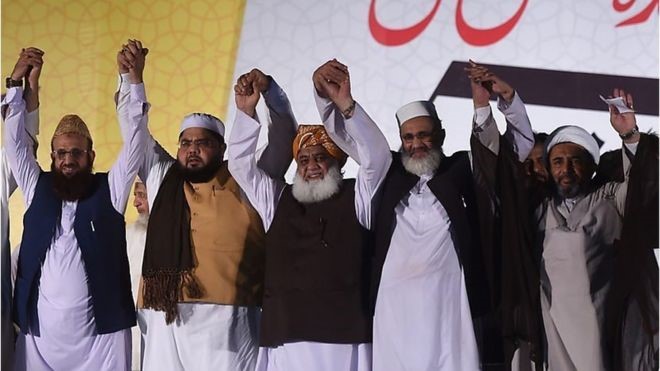Why is there a dispute over new religious bill in Pakistan’s Punjab?
Controversy is growing in Pakistan due to a bill passed in the provincial assembly of Pakistan. Concern has been expressed that there is limited space for religious tolerance and freedom in the country.
On 22 July, the ‘Tehfuz a Buniyaad a Islam’ bill was passed in the Punjab Legislative Assembly. Its aim is to protect the pillars of Islam.
This bill has not been made a law yet, but religious groups of the country have started the exercise to implement it.
This bill is particularly controversial in Sunni-dominated country of Pakistan. Concern has been expressed that the country’s Shia and Ahmadiyya community are on its target.
What is Bill?
According to the reports of local media, if this bill becomes law then the religious books and insulting the family and companions of Prophet Mohammad will be punished for up to five years and can be fined up to three thousand US dollars.
Apart from this, there will also be punishment for praising extremists, promoting purity and religious hatred.
The Directorate General of Public Relation of the Government of Punjab means that many new powers will come to the Public Relations Department.
The department will be able to stop the publication or import of such material which it considers against national interest, culture, religion or communal harmony.
Not only this, publishers and importers of published material will have to submit a copy of the material with the DGPR and even if they do not, there is a provision for punishment. After the enactment of the law, it will also be mandatory to write Khat-un-Nabiin (the last Prophet) before the name of Prophet Mohammad.
Why is it so important?
This law empowers state officials to prohibit books and religious material that they consider controversial or against the political and religious agenda of the government.
Effectively, this law would give the Punjab government the privilege of interfering in religious and political matters.
Particularly, the special reference in communal matters and the compulsion to write titles before the names reflect the deepening religious differences in Pakistan’s politics and society.
The choice of words for the bill indicates that the government is leaning towards radical Sunni groups. Sunni groups have long been demanding regularization of the freedom of religious minorities.
Recently, the National Assembly of Pakistan unanimously approved the proposal seeking to teach the Quran and its translation in universities.
The Curriculum and Text Book Board of Punjab recently banned more than 100 books, calling them anti-national and anti-religious.
A math book was banned due to the publication of a picture of a pig.
Pakistan already has strict laws against blasphemy that prohibits speech against Islam, communalism, rhetoric against the country and the military.
Which supporters, which opponents?
Many prominent leaders of Pakistan have supported this bill.
Assembly Speaker Chaudhary Parvez Elahi thanked the leaders of the government and the opposition for the passage of the bill. His party Pakistan Muslim League Q introduced the bill.
Law Minister Raja Basharat of the ruling Pakistan Tehreek-e-Insaf called this bill a step taken by Pakistan Prime Minister Imran Khan to re-implement the historic land vision of Medina.
It is believed that this bill is the result of the efforts of radical MLA Mu’awiya Azam who in a dramatic development took the copy of the bill to the grave of his father Maulana Azam. Maulana Tariq formed the anti-Shia extremist organization Sipah-e-Sahaba.
Many extremist groups of Pakistan have also welcomed this anti-blasphemy bill passed in the Punjab Assembly. At the same time, human rights activists and advocates say that this bill can be used to ban books.
Groups like the Human Rights Commission of Pakistan and Women’s Democratic Front say that the bill is against the constitution of Pakistan.
At the same time, the most fierce opposition to this bill is coming from Shia groups, who consider it a threat to their religious freedom.
Shia political party Majlis-e-Wahdat Muslemine says that this bill has been passed in the absence of many of its MLAs. Shia religious groups have also opposed this new political bill.
Amid the protest, Punjab Governor Chaudhary Mohammad Sarwar has said that he will sign the bill only after a consensus has been reached. He has also met with several religious groups.
What is Pakistan’s media saying?
There is a contradiction in the media of Pakistan on the basis of its ideology. On July 29, an editorial published in Dawn said that the bill could be criticized for religious intolerance.
Liberal commentator Nazam Sethi has said in an article that those who introduced the bill and passed it would not even read it.
He wrote in his article that the same happens with most religious books. He said that the passage of this bill and the stagnation regarding its implementation is a strategy to please everyone in a way and this case will remain pending for unconscionability.
At the same time, the radical TV commentator Oraya Maqbool Jaan, in his TV show Herf A Raaz, broadcast on pro-army channel Neo TV, underestimated the communal side of the bill and said that this bill is affecting the country This is in response to the plague of secularism and liberalism.
He said that secularism and liberalism have weakened Islamic education in the country and promoted atheism.




